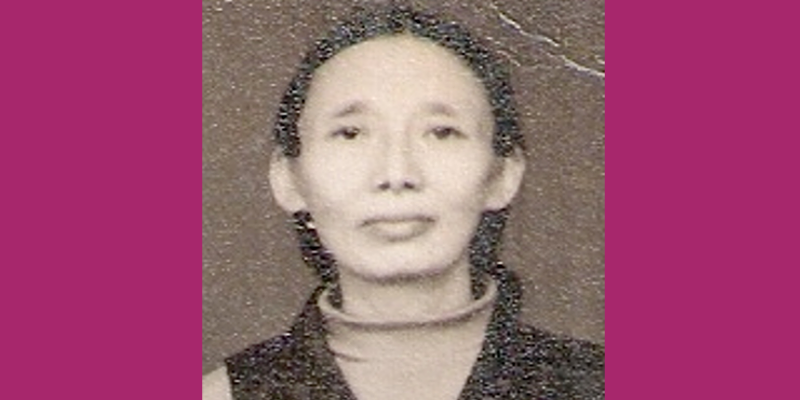Every country has stories about many female war heroes in her trying times. For instance, the allied force during the world war II had Nancy Wake who helped them in numerous ways to defeat the Germans, Japan had Nakano Takeko who fought heroicly in the Boshin war, and we all know about India’s Rani Lakshmi Bhai who fought fearlessly and sent chills among the British armies. Although I’m by no means any sort of a historian as such, however, I genuinely believe that Tibet must also have female war heroes at various times and that their contributions were either not recorded or deemed lesser significance by the mainstream. Interestingly while turning pages of Mikel Dunham’s book “Buddha’s Warriors,” I stumble upon an important episode about a Tibetan female whose name is Dorjee Youdon, which I would like to share here.
Mikel wrote, “In the 1950s, in Nyarong, the Chinese soldiers accompanied by civil officials proceeded from village to village, demanding the surrender of weapons. They then held thamzings. Village headmen, lamas, and prominent citizens were denounced, beaten, humiliated and sometimes executed. The whole area was rocked by these events, and any last illusions of compromise or peace were shattered when the Chinese turned against the tribal leaders whom they had previously honored and feted. Gyurme, an important tribesman was one example. He was away for business at Dartsedo when a number of Chinese soldiers came to his house and demanded that they- his mother, wife, young son and an old family retainer- surrender all weapons. When the Chinese were told that there were no guns on the property, without a single warning, the Chinese shot every one of them dead.
“A fiery young woman by the name of Dorjee Youdon, who knew the family who had been executed and whose husband, also a tribal leader, was away on business in Dartsedo at the time, flew into a rage. On behalf of all innocent families in Nyarong, she vowed to fight back. She called for a meeting of the men who were under her husband’s jurisdiction. She ordered them to ready their firearms.”
Jamyang Norbu, the well known Tibetan writer, and historian was also quoted in Mikel’s book. According to Jamyang, “She dispatched letters all over eastern Tibet, urging the people to rise against the Chinese. Dressed in a man’s robe and with a pistol strapped to her side, she rode before her warriors to do battle with the enemy. She ferociously attacked Chinese columns and outposts everywhere in Nyarong. The remaining Chinese soldiers and officials retreated to the castle of the female dragon, where they proceeded to hold out.
“The castle was stormed, with Dorjee Youdon herself leading the charges. But the great wall of that old castle was built to withstand such attacks and without artillery (which the rebel did not have) were well-nigh impregnable. Causalities soared. Finally, Dorjee Youdon lay siege to the castle. By now the whole courtyard was in ferment, and many other villages and tribes rose up to fight. Dorjee Youdon‘s task at the castle was proving to be difficult. The Chinese garrison was well stocked with food and ammunition, and they also had a spring of clear water within the walls.
“After six months, six hundred troops from the Eighteenth Division arrived from Kanze to relieve their beleaguered comrades in the castle. Dorjee Youdon met them at Upper Nyarong and managed to defeat them. About four hundred Chinese soldiers were killed, but two hundred managed to break through the siege lines and enter the castle. However, another column of about fifteen to twenty thousand soldiers poured in from Drango and Thau in the east. DorjeeYoudon was forced to give away, and the siege was lifted. Yet the fighting accelerated and lasted for a month, after which the superior numbers and arms of the Chinese began to tell.
“The Chinese suffered heavy losses, about two thousand dead and many more wounded. Two hundred officers were also killed. Their bodies were buried with much ceremony outside the old castle. Finally the Chinese regained some measure of control in the country, and the rebels take to the hills, where they initiated a relentless guerilla campaign. Day by day, their numbers swelled.”
Sadly many of us including those who are supposedly well versed in Tibetan history and literature seem to have little knowledge about Dorjee Youdon and her role in defending our country from the invading Chinese armies. While we celebrate all the Dharma related female luminaries, we are completely oblivious to those who stood up, fought for and gave their life up for our country. I think it is high time that Schools should introduce their narratives to the children if not as a piece of history in textbooks, at least orally by the teachers, parents should also tell their stories to kids during bed times, college goers and many of our social media language police who love bashing youngsters should devote some time and do research about Dorjee Youdon and other female war heroes so that we learn about their life and struggle and more importantly their heroic role be honored with due respect and dignity and passed down the legacy to our younger generations. Thank you, Mikel Dunham, for including her heroic story in the book. Also, thank you Jamyang Norbu for the story contribution.
Hats off to Hero Dorjee Youdon!







Leave a Reply